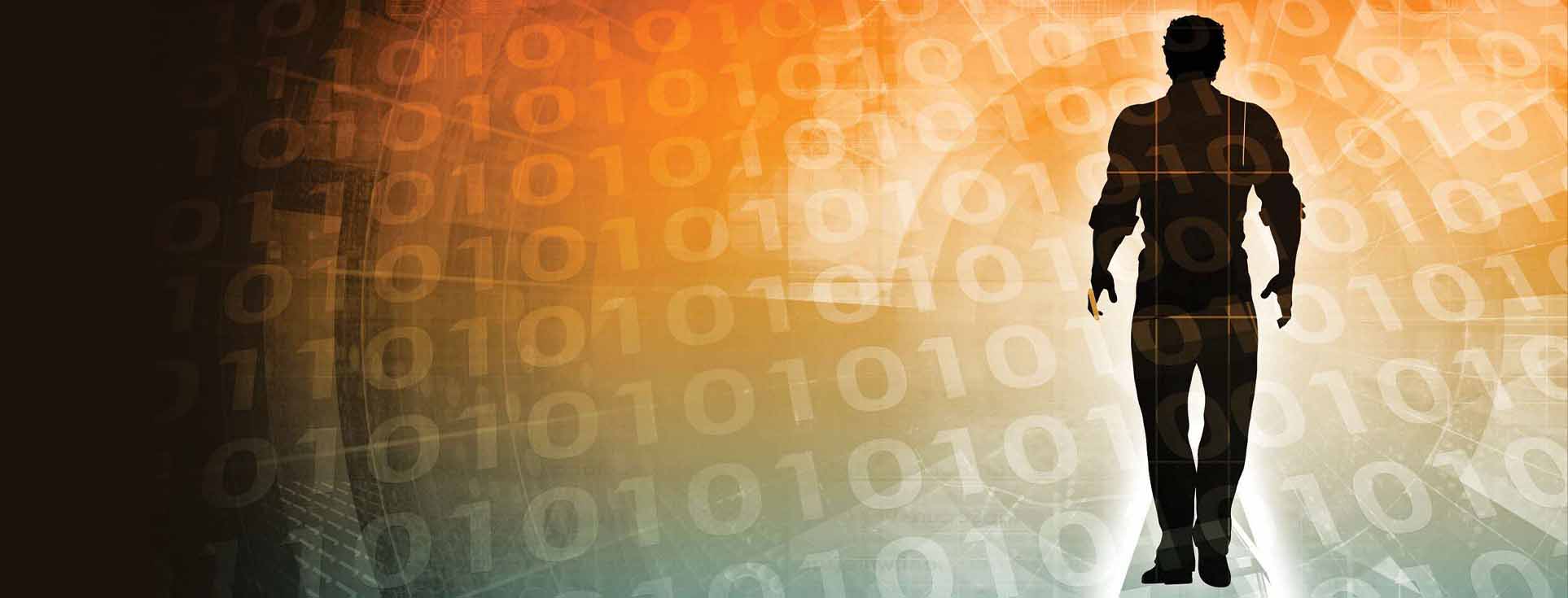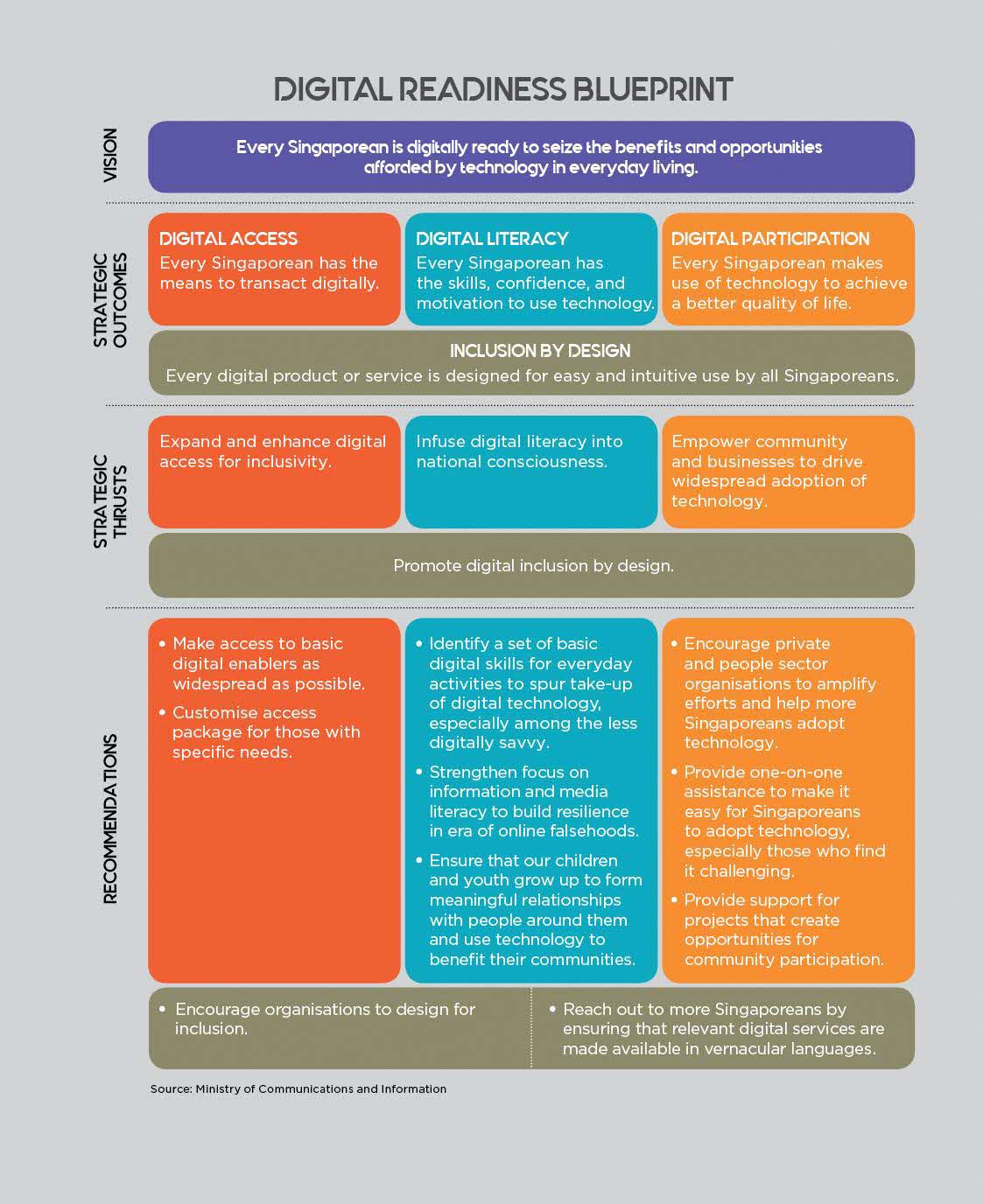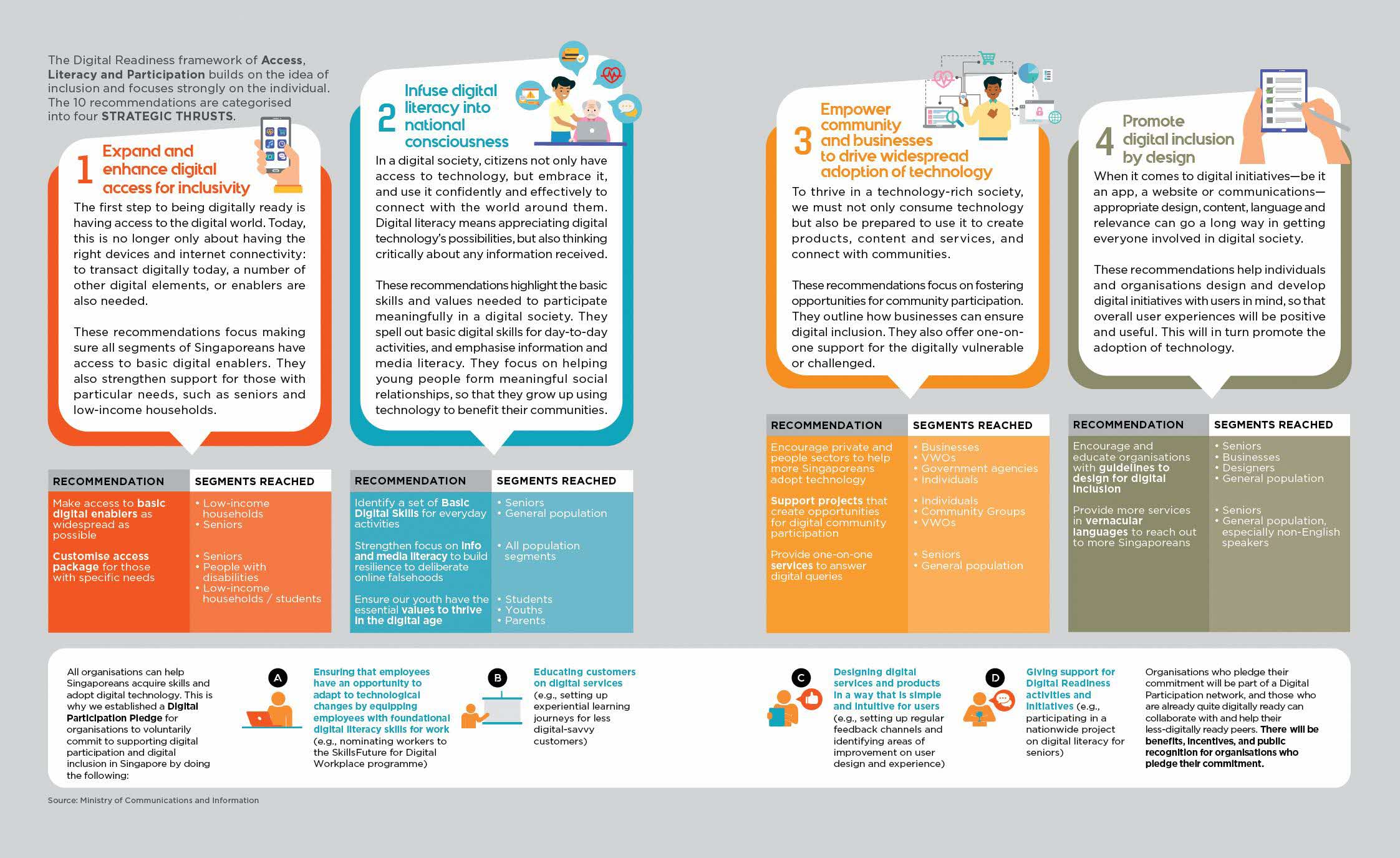Readying Singapore to be a Digital Society
ETHOS Issue 21, July 2019

In a terrifyingly prescient 2016 episode of the TV series Black Mirror, Lacie, a young woman obsessed with status, navigates a world in which social ratings determine access to services, rewards and opportunity. Every interaction she has—with the cashier at the supermarket checkout, a stranger in the lift, her best friend—is assessed by a rating: anything below a 4.5 out of 5 is unthinkable. In the episode, Lacie spirals into obscurity in a vicious cycle of successively lower ratings, until she eventually ends up where all 0.0 raters in her world end up: a prison cell.
Lacie’s story is presented as a cautionary tale: despite her best efforts, she gradually loses control over her identity, life and destiny. Her world is uncomfortably close to our world. China, for example, has laid the groundwork for a social credit rating system on an unprecedented scale. One cannot help but wonder about the implications for some 1.4 billion Chinese.
The sophistication of technology today is cause for both celebration and concern. Each new technological disruption has the potential to reshape how humans think, act, interact and live, even as it addresses profound human problems. At the same time, new challenges and unintended consequences arise, such as those captured so powerfully in Black Mirror. How do we gird ourselves to live in such a future; to embrace its promise while avoiding its pitfalls?
What Is a Digital Society?
There are many ways to describe this future: it is full of potential and possibility, but also unknowns and wicked problems. It is also fundamentally and inexorably digital. Digitalisation has brought us to a tipping point: where once we marvelled at how we could store information on magnetic tape or transmit it around the world, we are now witnessing how entire worlds can exist in the virtual realm, built on logic and value systems that have surpassed their roots in the physical world. There are no maps or guidebooks to this vast new territory: only possibilities surmised by the visionaries among us, and unfamiliar dangers lurking around each bend.
How do we gird ourselves to live in the future; to embrace its promise while avoiding its pitfalls?
Some nations have already ventured into these uncharted lands. Estonia offers what is known as e-Residency—where people around the world who have never stepped into the country can be acknowledged as Estonian residents, Singaporeans included. Private enterprise in China, hungry for progress, has succeeded in building an economy where the smallest hole-in-the-wall stall takes for granted that you will not pay in hard cash. On a recent trip to China, I was offered only two options for my bill everywhere—AliPay, and WeChat Pay—and given incredulous looks when I asked to use the humbler cash alternative. On a different end of the spectrum, India has for the last decade been building up Aadhaar, a pervasive digital identity system serving 1.3 billion residents via mobile biometric means. This might very soon usher in not only a mobile-first or mobile-only but a post-mobile era for online payment services.
Singapore too is making inroads. We have continually built infrastructure for connectivity, from 3G to 4G and now 5G. We are piloting and testing frontier technologies, including autonomous vehicles. We set up a council looking specifically into the ethics of AI use. Most recently, we introduced legislation to be used against the most egregious of online falsehoods that are propagated with malicious intent. We have even set up an institute in Nanyang Technological University dedicated to studying the impact of technology on society in a multi-disciplinary, multi-stakeholder manner.
A wide range of steps have been taken, yet there is still more to be done in understanding digital society. What will it mean for every last Singaporean to be part of this new world? How can we ensure that the necessary skills and mind sets required become an ingrained part of who we are?
Singapore’s Smart Nation drive is not just inspirational and aspirational—it is existential.
Why Do We Need To Be Prepared for a Digital Society?
Singapore’s Smart Nation drive is not just inspirational and aspirational—it is existential. When Prime Minister Lee Hsien Loong announced in 2014 his vision for Singapore to be a “nation where people live meaningful and fulfilled lives, enabled seamlessly by technology, offering exciting opportunities for all”, he also spoke about needing the right organisations, the right skills, and most of all, the right mindsets for this.1
Today, Singapore is implementing this vision by transforming our economy to create jobs and opportunities in this new digital paradigm, and by building digital government infrastructure and capabilities that fundamentally transform the public sector. In parallel, the government is also raising the digital readiness quotient of Singaporeans, so that all can participate in and transact within this digital society without coming to harm. Singapore must do all three things—digital government, economy and society—if we are to deem ourselves to have succeeded.
The values that have guided us in the building of our nation will not change: hard work and resilience, meritocracy, good governance, multiculturalism. The values that have guided the work of the public service likewise will and must not change: integrity, service, excellence. This is because people fundamentally have not changed. We have the same needs, wants, desires, dreams—we are simply living them out in a new digital era.
Digital technology has always only ever been a tool for human hands and minds, because we are Homo sapiens with ethical values whose decision-making processes cannot readily be replicated. Many stories have been told of how computers have failed once and again, sometimes spectacularly, without the intervention of a human being: YouTube bots mistakenly conflated the burning of Notre Dame with 9/11; Target’s algorithms identified a teenager as being pregnant, after analysing her shopping patterns, and sent mailers to her house; Google’s image recognition tagged pictures of African-Americans as gorillas. As we grapple with visions of Ultron or Skynet rising up against humanity, we would do well to remember that in a digital society, we are still the only ones in charge of making sure that we use technology for good, and that people are not reduced to mere ratings and patterns.
We are still the only ones in charge of making sure that we use technology for good, and that people are not reduced to mere ratings and patterns.
Digital Readiness for a Digital Society
It is, of course, one thing to understand and welcome digital society, and quite another to be digitally prepared to make the most of it. How do we ready ourselves to live and thrive in a digital age?
At Singapore’s Ministry of Communications and Information (MCI), we see Digital Readiness as having access to digital technology, having the literacy and know-how to use this technology, and being able to participate in and create with technology. At the basic level, digital readiness involves providing access to digital connectivity and devices in a widespread, affordable manner. Hand-in-hand with basic access is basic literacy—having the skills and understanding to use digital technology safely and confidently—whether in tasks like operating a mobile device, or having good cyber hygiene habits.
To be digitally ready includes being able to guard against online ills. A stark difference between yesterday and today is the complexity and speed of information use. We need to be self-aware and discerning about what we do online. The 3 Rs of literacy in the analogue world (reading, writing and arithmetic) have been joined by three more: Information, Media, and Cyber Literacy. Much has been said about fake news having been around since the Garden of Eden; in a digital society, being aware of the trade-offs between convenience and privacy, experience and security will help us avoid the temptation of the online serpents of misinformation and hackers. We need to engage with technology safely, smartly, and kindly, as the Media Literacy Council’s Better Internet Campaign exhorts us to, rejecting toxic behaviours like cyber bullying, online vigilantism and doxxing.
Closely linked is the idea of Digital Participation. In a digital society, we need to not just be good consumers and receivers, but also good creators, producers, communicators, translators. All individuals and organisations must participate in this. We should strive to enable others to engage with technology, especially the most digitally vulnerable. Everyone needs to be ready to use these tools, so that they have a chance to claim a share of these new digital opportunities for themselves.

Who and How To Build Digital Readiness
How do we do this? We know that building digital readiness does not happen exclusively in the digital domain—in fact, it happens in the physical one, and we will succeed only if we bridge the physical and the digital.
This begins by being inclusive. Digital readiness requires the involvement of everyone, not just the ones who “do tech”. MCI began by setting up the Digital Readiness Programme Office in 2017, an experimental start-up with four people. Charged with strengthening the digital readiness of all Singaporeans, we started out by bringing together many disparate parties. We generated momentum, raised awareness, and convinced people that this was an important endeavour.
As a result, the Digital Readiness Blueprint was produced, with recommendations advocating last-mile digital inclusion, while still caring for public needs. Last year, the 3P Digital Readiness Council was set up to provide strategic direction and to build networks for the next phase of Digital Readiness. One of its first initiatives was the Digital Participation Pledge, launched this year to encourage organisations to pledge commitment and support. All government ministries have since taken the pledge. We have also set up the Our Singapore Fund for Digital Readiness, which supports ground-up efforts from community and student groups, developed a National Framework for Digital Media and Information Literacy to guide programme owners in their delivery of digital literacy programmes and courses, and rolled out a Tech Connect service to be progressively made available at all community centres across the island, where Singaporeans can get one-on-one ‘concierge’ assistance with their digital needs. All this was made possible only through collaboration with other agencies like the People’s Association, the Ministry of Culture, Community & Youth and the Ministry of Education, and we hope that through such initiatives we can sustain efforts to help all Singaporeans live and thrive in a digital society.
We need to not just be good consumers and receivers, but also good creators, producers, communicators, translators.
In the course of thinking about the work of digital readiness, MCI has been guided by four main principles:
Different strokes, different folks
Everyone approaches digital readiness from a different starting point. We are therefore focused on levelling up people to a better understanding of what tech is and can do, from whatever current plane they are on, to whatever is a reasonable improvement for each individual.
Know the baseline, know what success looks like
We have to know where we are today, and where we are headed. Earlier this year, we completed a baseline survey for Digital Readiness, the first of its kind in Singapore. Engaging with 3,000 respondents representing Singaporean society today, we set out to understand Singaporeans’ levels of access to technology, digital literacy and digital skills, and their attitudes towards technology.
Find the hook
The UK’s Behavioural Insights team has suggested that if we want to encourage a behaviour, we have to make it Easy, Attractive, Social and Timely (EAST). This is where the digital readiness conversation turns to hooks and killer apps. We need to know the compelling reasons that make people want to transact digitally, so there is an incentive to learn the skills needed. For example, Netscape redefined surfing in the early days of the internet; iTunes in 2001 made it difficult for consumers to say no to Apple; Facebook has revolutionised how people network, interact and even live their lives today. What is the equivalent in health and wellness, communications and perhaps wayfinding applications that could encourage even the fearful to try their hand at technology? The Smart Nation Digital Government Group has, for example, developed the Moments of Life app, designed to be helpful in ways that people may not even think about, at specific moments of their lives—when getting married, when becoming a parent for the first time, when reaching a senior age. This is a start, but there remain many more possibilities for us to think about.
Empathy,empathy,empathy
It all starts with knowing who we are trying to help, which means spending real time on the ground, talking to the community, to Social Service Agencies, to industry, understanding pain points, aspirations and ideas. In the process of ensuring that all groups are able to thrive in a digital society, we then learn a lot about the characteristics of these groups, including their needs and hopes for the future.

What Are the Challenges?
This is not easy. Like every journey of discovery, the road to being a Smart Nation and digital society is paved with good intentions and replete with exciting innovations, but there are very different needs and different levels of preparedness that we need to address.
There are many unknowns that emerge as we push forward with digital society. In the present, we are focused on implementation, grounded in current paradigms. But we cannot know how each new disruptive idea will change the playing field, and at what speed. We need to be prepared to constantly learn and unlearn, plan and adapt, celebrate and regroup.
As we advance, we also find that the scope of digital readiness expands. Basic access, skills and knowledge for the digitally vulnerable precede the advent of deep fakes, fake news and anti-social and anti-civil behaviour in the online space. All of these behaviours are bound up with what it means to be a good citizen—and that’s why there is never a dull moment in this job.
The multi-stakeholder, multifaceted nature of digital readiness requires shifts in organisational mindsets. As digital society throws up new problems to solve, we in the public sector must find new ways of doing things, and perhaps even let go of old paradigms, such as traditional policy/ops divides or organising around vertical domains. The need to work across government will become more vital than ever. This is also why the user journey mindset is so important, and why good user research is central to making good digital products. Understanding that needs and services do not occur in unrelated silos, governments around the world, including Singapore, are beginning to implement the “Tell Us Once” approach to providing citizen services.
The biggest challenge, however, are the implications of technology on social transformation: on inequality, social mixing and mental models. Much has been said about the digital divide further widening existing divides of class and income.2,3 We need to be circumspect about this, and not inadvertently exacerbate extant issues. As public servants we should strive for deep, human understanding, by spending time talking to people and listening to their stories. Such an ethnographic approach has long been advocated by anthropologists and others, and have been applied both internationally4 and in Singapore.5,6 Our traditional analytic approaches should continue, but in tandem with these human stories: without them we cannot hope to say that we know how to bring Singapore into the digital future, or for whom.
We cannot know how each new disruptive idea will change the playing field, and at what speed.
Whither the "Digital Singaporean"?
Digitalisation will transform our lives. Our destiny as a nation, however, is up to us. How will we continue to remain essentially Singaporean, even as we blossom and transform into a digital nation, people and society? What must we retain, and how will we know that we have survived?
I think that the first step is for Singapore to come alongside on this journey together: by committing to be part of the Digital Readiness movement, whether as an organisation or as an individual, by being aware of digital developments and their impact on us as a country, and by helping one another tackle the challenges of daily digital life. The story of how Singapore thrives with technology is already being told internationally, but much of that story is still unwritten. Much depends on the willingness and readiness of every Singaporean to contribute to it.
Throughout history, there has always been a desire for mankind to peer through the veils of time and predict the future. The oracles of ancient Greece, the prescient imaginations of polymaths like Leonardo da Vinci, writers such as Isaac Asimov, and modern-day savants such as Steve Jobs and Elon Musk, all speak of a deep human desire to know and leap into the future.
We now know that this future is digital. While once many viewed this future primarily with anxiety—Orwell writing about 1984, or the dystopias of Black Mirror—we should also look at the myriad possibilities of our digital future and society with hope and excitement. We are not doomed to fall into the same spiral as Lacie on our Netflix screens—as long as we understand what the future holds, come together in our communities and work alongside one another, so that all Singaporeans can have the access, skills and perspectives needed to thrive in a digital society.
NOTES
- “Transcript of Speech by Prime Minister Lee Hsien Loong at Smart Nation launch, 24 November 2014”, Smart Nation Singapore, accessed April 15, 2019, https://www.smartnation.sg/whats-new/speeches/smart-nation-launch.
- “Regardless of Class”, Channel News Asia, video, posted September 24, 2018, accessed June 7, 2019, https://www.channelnewsasia.com/news/video-on-demand/regardless-of-class/regardless-of-class-10751776.
- Chua Mui Hoong, Singapore, Disrupted (Singapore: ST Press, 2018).
- Clifford Geertz, The Interpretation of Cultures, 2nd ed. (New York, NY: Basic Books, 2000).
- Teo You Yenn, This Is What Inequality Looks Like (Singapore: Ethos Books, 2018).
- David Chan, ed., How Working Together Matters: Adversity, Aspiration, Action (Singapore: World Scientific Publishing, 2018).

